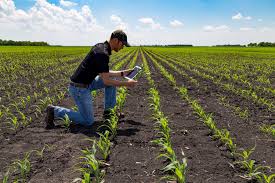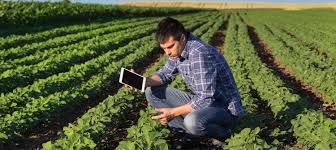Farm management comprises two words: ‘farm’ and ‘management.’ Literally, ‘farm’ means a piece of land where crops and livestock enterprises are undertaken under common management and have specific boundaries. ‘Management’ refers to the act or art of managing.
Due to its recent origin, the term ‘farm management’ conveys different meanings to different people. Some consider it another name for production economics or agricultural economics, while others view it as the farmer’s art of carrying out daily routines.
The daily work of supervising farm labor and implementing directives by public or private-employed farm managers is often referred to as farm management. In reality, there is no single definition acceptable to all. What is more important is understanding what this term actually means.
The basic principle of farm management is selecting the best alternative(s) among several options to achieve the best results and desired goals.
Farm management is the art of applying economic principles in the management of a farm business. It can also be defined as the science that deals with the organization and operation of a farm to generate maximum possible income on a continuous basis.
It is the science of combining and operating production factors including land, labor, and capital and selecting crop and livestock enterprises to achieve maximum and continuous returns for the most elementary farming units.
Farm management is not only a pure science but also an applied science. It is a pure science because it involves the collection, analysis, and explanation of facts and the discovery of principles. It is an applied science because it addresses the identification and solution of farm problems.
Perceptions of Farm Management

Farm management is perceived in three ways by extension workers:
- Providing organized guidance to practicing farmers to improve their managerial skills and abilities.
- Assisting farmers in analyzing production problems to arrive at profitable management decisions.
- Identifying farmers’ problems that hinder profitable farm organization and operations and relaying them to researchers.
From the researchers’ perspective, farm management involves:
i. Collecting data from farmers’ fields.
ii. Analyzing and interpreting the data to make inferences for potential farm improvements and recommendations.
Read Also: The Benefits of Beekeeping and Honey Production
The Scope of Farm Management

Farm management is generally considered a part of microeconomics. It deals with resource allocation at the level of an individual farm. While it is concerned with resource allocation in the agricultural sector and the economy as a whole, its primary focus is the farm as a unit.
It covers aspects of farm business that impact economic efficiency. This includes decisions on:
i. The types of enterprises to combine.
ii. The kinds of crops and varieties to grow.
iii. The dosage of fertilizers to apply.
iv. The implements to use.
v. The methods of performing farm functions.
Farm management is principally concerned with farm organization and farm operation.
Farm Organization
Organizing a farm requires making numerous decisions, including:
i. Selecting the farm.
ii. Planning the cropping system.
iii. Determining erosion-control practices.
iv. Selecting livestock enterprises.
v. Deciding on the types and number of buildings, labor, and power required.
vi. Identifying machinery needed to operate the business.
Farm operation involves planning the cropping system based on expected costs and income. This includes deciding:
i. How much of each crop to grow on various soil types.
ii. Which varieties to plant.
iii. The amount of seeds and fertilizers to use per hectare.
For livestock, decisions include:
i. The class of livestock to produce and the production system.
ii. Selecting breeding animals.
iii. Deciding the season for birthing and marketing mature animals.
iv. Choosing feed types and feeding rates.
The farm operator must decide how to combine resources most effectively to achieve production goals at a reasonable cost.
To produce crops and livestock, two items are added to land by management: capital (in the form of buildings, power machinery, and land improvements) and labor. The farmer decides how much labor to use and the types and amounts of buildings, power, and machinery to supply.
In summary, farm organization involves two types of decisions:
- Determining the kinds and amounts of products to produce.
- Deciding the amounts and forms of production agents to use to achieve the desired commodities.
Farm organization also involves decisions on which agricultural enterprises to include and how to combine them.
Read Also: How to Establish an Apiary and Produce Honey
Farm Operations

Farm operation focuses on performing farm work efficiently. It involves decisions such as:
i. Whether to feed cattle by hand or with a self-feeder.
ii. Whether to milk cows by hand or with a milking machine.
iii. Planning work schedules for the season and daily operations.
iv. Prioritizing tasks when multiple jobs need to be completed in a short time.
There are various ways to perform farm operations, with some methods being more efficient in specific situations. On a diversified farm, numerous tasks require different skills. For repetitive tasks, it is crucial that farmers and workers use efficient methods.
Farm operation involves implementing decisions on selected enterprises and their combinations. An enterprise refers to any business undertaking. In farming, an enterprise is a type of production (such as crops or livestock) with distinct activities.
The group of activities related to an enterprise is called its production system. Activities within the production system are known as husbandry practices.
Husbandry practices include:
i. Land preparation.
ii. Planting.
iii. Fertilizing.
iv. Weeding.
v. Pest and disease control.
vi. Harvesting.
vii. Marketing.
This article has explored the definition and scope of farm business management. Farm management involves applying economic principles to manage a farm business effectively.
The perceptions of farm management, the meaning and scope of farm organization, and farm operations have also been discussed. Farm management plays a critical role in agriculture by optimizing resource allocation, improving productivity, and ensuring sustainable farm operations.
Do you have any questions, suggestions, or contributions? If so, please feel free to use the comment box below to share your thoughts. We also encourage you to kindly share this information with others who might benefit from it. Since we can’t reach everyone at once, we truly appreciate your help in spreading the word. Thank you so much for your support and for sharing!

